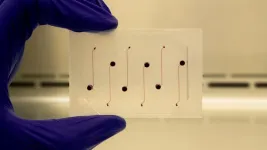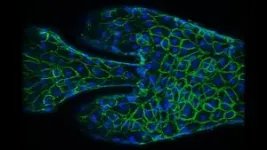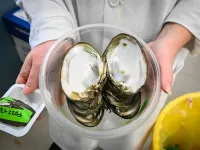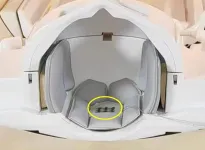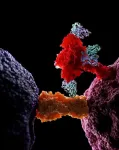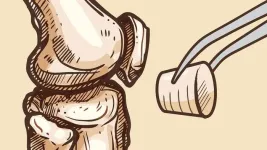(Press-News.org) The pharmaceutical drug development and approval process is a multi-step undertaking that requires a plethora of testing before reaching the market. Even then, humans respond differently to drugs depending on their individual bodies and medical needs.
Dr. Abhishek Jain, associate professor in the Department of Biomedical Engineering, and his lab received a grant from Texas A&M Innovation to continue developing an advanced vessel-chip deployment platform for large-scale pharmaceutical testing services that holds promise for personalized and accurate testing.
For the past eight years, Jain and his lab have focused their research efforts on creating blood and lymphatic vessel-chips, which are tissue-engineered microfluidic devices that mimic human circulatory systems and provide a platform for preclinical drug discovery.
Since these systems are built using human cells that may also be derived from individual patients, these chips may lessen the need for animal testing and provide a more physiologically relevant and personalized testing platform before human clinical trials.
“Testing drugs is the ultimate commercial value from this because you’re always interested in solving a disease and curing patients,” Jain said “This system can be used from discovery all the way to the translational pipeline, where you can immediately initiate informed clinical trials of venous, vascular and hematological diseases and know what the outcome on an actual human might be. You can fine-tune your clinical trials or reduce the length of the clinical trials and make them much more efficient.”
Jain’s research was one of three projects from the biomedical engineering department selected to receive a Texas A&M Innovation Translational Investment Fund (TIF) grant. Dr. Feng Zhao was selected for her project creating an engineered vascular graft and John Hanks and joint faculty Amir Tofighi Zavareh were selected for their project developing a human-informed full stack software for arterial disease screening.
TIF Grants
TIF grants provide system researchers with services and support to commercialize products to impact lives through translation — the act of moving scientific discoveries from the lab into the real world.
Jain’s work on these vessel-chips has culminated in the founding of a startup company with his current and past trainees. Jain said the TIF grant will help build confidence in customers by ensuring that the vessel-chips are reliable, reproducible and automated for ease of use.
“This grant allows us to test the hypothesis that this vessel-chip is actually ready for market adoption,” Jain said. “This is also an opportunity that Texas A&M has given us to train the future workforce of this startup. For example, I am dedicating these funds to partially support a graduate student, Jason Eades, and my staff engineer, Julie Armand, who are helping me in launching the company.”
Jain said that the momentum offered by the TIF also allowed him to hire Dr. Tanmay Mathur, a previous graduate student of Jain’s, to help make the startup successful.
“Texas A&M University has a rich legacy of helping faculty translate their ideas into actual startups so that we can realize the vision of helping society,” Jain said. “The ultimate purpose of our university is to make an impact on the lives of the people, and I think this is a very conscious, deterministic step to be able to do so. Without these funds, it would have taken much more time to launch a startup. These funds are elevating the value of this product.”
By Bailey Noah, Texas A&M Engineering
###
END
Engineered circulatory systems may help fight disease
Vessel-chip technology may offer a future of more personalized pharmaceutical drug testing, leading to our improved ability to combat disease
2024-05-31
ELSE PRESS RELEASES FROM THIS DATE:
Moffitt Cancer Center and Virogen Biotechnology forge groundbreaking partnership to accelerate oncology and immunotherapy innovations
2024-05-31
TAMPA, Fla., and PLEASANTON, Calif. — Moffitt Cancer Center, a world-renowned cancer treatment and research center, and Virogen Biotechnology Inc., a clinical-stage biotechnology company, announced a groundbreaking strategic partnership today. This collaboration aims to propel the development of Virogen's cutting-edge fusion protein, VG712 (Resimmune), addressing significant unmet needs in oncology and immunotherapy.
Under this strategic alliance, Moffitt will offer Virogen priority access to ...
Ivonescimab plus chemotherapy in non–small cell lung cancer with EGFR variant
2024-05-31
About The Study: Ivonescimab plus chemotherapy significantly improved progression-free survival with tolerable safety profile in patients with non–small cell lung cancer who previously underwent EGFR tyrosine kinase inhibitor (EGFR-TKI) treatment and may offer a new treatment option for patients with TKI resistance.
Quote from corresponding author Li Zhang, M.D.:
“For patients with non-small cell lung cancer whose illness has progressed while receiving EGFR tyrosine kinase inhibitor (EGFR-TKI) therapy, especially the ...
Mussels downstream of wastewater treatment plant contain radium, study reports
2024-05-31
UNIVERSITY PARK, Pa. — Burrowed into streambeds and rarely moving for their decades-long lifespans, freshwater mussels are biomonitors, meaning they indicate how clean their environment is, according to Penn State researchers. As the bivalves feed on organic matter and filter the water around them, their inner tissues and hard shells begin to reflect whatever is in their environment — including radioactive particles.
A pair of researchers from Penn State’s Department of Civil and Environment ...
This self-powered sensor could make MRIs more efficient
2024-05-31
MRI scans are commonly used to diagnose a variety of conditions, anything from liver disease to brain tumors. But, as anyone who has been through one knows, patients must remain completely still to avoid blurring the images and requiring a new scan. A prototype device described in ACS Sensors could change that. The self-powered sensor detects movement and shuts down an MRI scan in real time, improving the process for patients and technicians.
During an MRI scan, a patient must stay entirely still for several minutes at a time, otherwise “motion artifacts” could appear and blur the final image. To ensure a clear picture, patient movement needs to be identified as ...
Cognitive declines preceding Alzheimer’s diagnosis lead to credit card, mortgage delinquency
2024-05-31
(May 31, 2024) — In the years prior to an Alzheimer’s disease or other memory disorder diagnosis, credit scores begin to weaken and payment delinquency begins to increase, concludes new research led by Georgetown University. The findings show consistent deterioration in these financial outcomes over the quarters leading up to diagnosis. The findings also show that credit card and mortgage delinquencies, specifically, both increase substantially prior to diagnosis.
The research was released today by the Federal Reserve Bank of New York (FRBNY). (“The Financial Consequences of Undiagnosed Memory Disorders”).
“Most memory disorders ...
Eye-tracking techniques could help primary care providers diagnose autism sooner, more accurately
2024-05-31
INDIANAPOLIS — Nearly 3% of all children in the United States are diagnosed with autism, according to the Centers for Disease Control and Prevention. But a collaborative team of researchers at Indiana University and Purdue University are finding ways to make the right diagnosis sooner.
“The number of children needing autism evaluations exceeds the capacity of specialists trained to provide this service,” said Rebecca McNally Keehn, PhD, assistant professor of pediatrics at the IU School of Medicine. “Children and their families are currently waiting a year or more to access evaluations. ...
Antibodies may aid effort to fight influenza B: Study
2024-05-31
Researchers at Vanderbilt University Medical Center have isolated human monoclonal antibodies against influenza B, a significant public health threat that disproportionately affects children, the elderly and other immunocompromised individuals.
Seasonal flu vaccines cover influenza B and the more common influenza A but do not stimulate the broadest possible range of immune responses against both viruses. In addition, people whose immune systems have been weakened by age or illness may not respond effectively to the flu shot.
Small-molecule drugs that block neuraminidase, a major surface glycoprotein of the ...
ASCO: Novel CAR T therapy and shorter targeted therapy durations show promise for patients with leukemia
2024-05-31
Novel CAR T cell therapy obe-cel yields strong remission rates in adults with relapsed or refractory B-ALL (Abstract 6504)
The novel anti-CD19 autologous chimeric antigen receptor (CAR) T cell therapy obecabtagene autoleucel (obe-cel) achieved durable remissions in 40% of patients with relapsed or refractory B-ALL without a subsequent stem cell transplant (SCT), according to results from the Phase Ib/II FELIX clinical trial presented today by Elias Jabbour, M.D., professor of Leukemia.
At a median follow-up of 21.5 months, these patients were in ongoing remission ...
Synthetic plugs offer alternative to total knee replacements
2024-05-31
Osteochondral defects (OCDs) can cause damage to cartilage and underlying bone, leading to chronic pain and loss of joint function. Depending on the extent of damage, individuals must undergo surgical treatment, the most extensive being total knee replacement, which over 800,000 Americans undergo each year.
Dr. Melissa Grunlan, professor in the Department of Biomedical Engineering at Texas A&M University, received a grant from the National Institute of Arthritis and Musculoskeletal and Skin Disease, a suborganization of the National Institutes ...
CU researchers analyze prevalence, impact of ethical or religious barriers to providing medical aid in dying
2024-05-31
Recently published research led by the University of Colorado Anschutz Medical Campus examined the prevalence — and impact — of physicians’ ethical or religious barriers to their involvement in medical aid in dying (MAiD), a multi-step process where a physician provides a terminally ill adult with decision-making capacity with a lethal dose of medication to end their life.
The research article, “Conscience-Based Barriers to Medical Aid in Dying: A Survey of Colorado Physicians,” was published this May in the Journal of General Internal Medicine. It shows that 26% of physician ...
LAST 30 PRESS RELEASES:
University of Ottawa Heart Institute, the University of Ottawa and McGill University launch ARCHIMEDES to advance health research in Canada
The world’s largest brain research prize awarded for groundbreaking discoveries on how we sense touch and pain
Magnetofluids help to overcome challenges in left atrial appendage occlusion
Brain-clearing cells offer clues to slowing Alzheimer’s disease progression
mRNA therapy restores fertility in genetically infertile mice
Cloaked stem cells evade immune rejection in mice, pointing to a potential universal donor cell line
Growth in telemedicine has not improved mental health care access in rural areas, study finds
Pitt scientists engineer “living eye drop” to support corneal healing
Outcomes of older adults with advanced cancer who prefer quality of life vs prolonging survival
Lower music volume levels in fitness class and perceived exercise intensity
Of crocodiles, counting and conferences
AERA announces 2026 award winners in education research
Saving two lives with one fruit drop
Photonic chips advance real-time learning in spiking neural systems
Share of migratory wild animal species with declining populations despite UN treaty protections worsens from 44% to 49% in two years; 24% face extinction, up 2%
One in 20 babies experiences physical abuse, global review finds
Tundra tongue: The science behind a very cold mistake
Targeting a dangerous gut infection
Scientists successfully harvest chickpeas from “moon dirt”
Teen aggression a warning sign for faster aging later in life
Study confirms food fortification is highly cost-effective in fighting hidden hunger across 63 countries
Special issue elevates disease ecology in marine management
A kaleidoscope of cosmic collisions: the new catalogue of gravitational signals from LIGO, Virgo and KAGRA
New catalog more than doubles the number of gravitational-wave detections made by LIGO, Virgo, and KAGRA observatories
Antifibrotic drug shows promise for premature ovarian insufficiency
Altered copper metabolism is a crucial factor in inflammatory bone diseases
Real-time imaging of microplastics in the body improves understanding of health risks
Reconstructing the world’s ant diversity in 3D
UMD entomologist helps bring the world’s ant diversity to life in 3D imagery
ESA’s Mars orbiters watch solar superstorm hit the Red Planet
[Press-News.org] Engineered circulatory systems may help fight diseaseVessel-chip technology may offer a future of more personalized pharmaceutical drug testing, leading to our improved ability to combat disease
